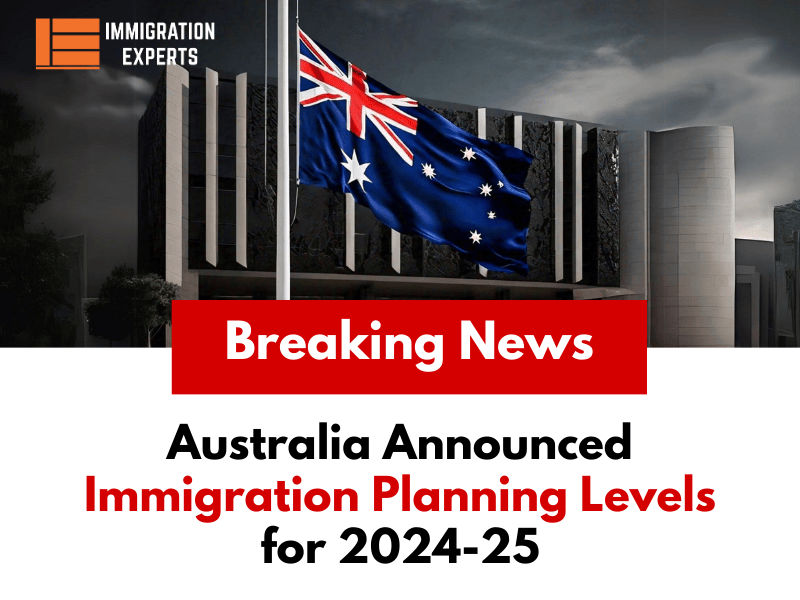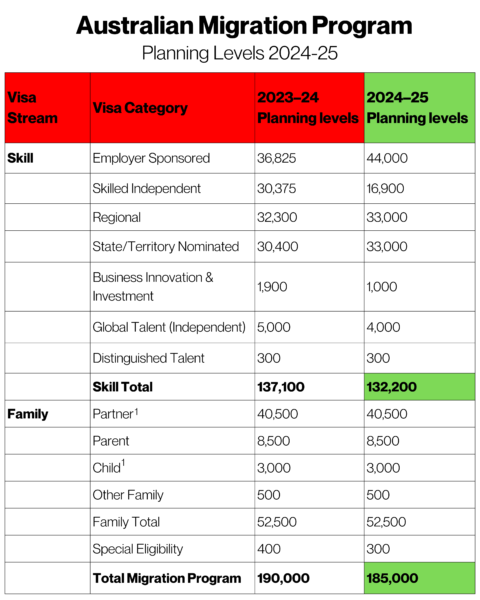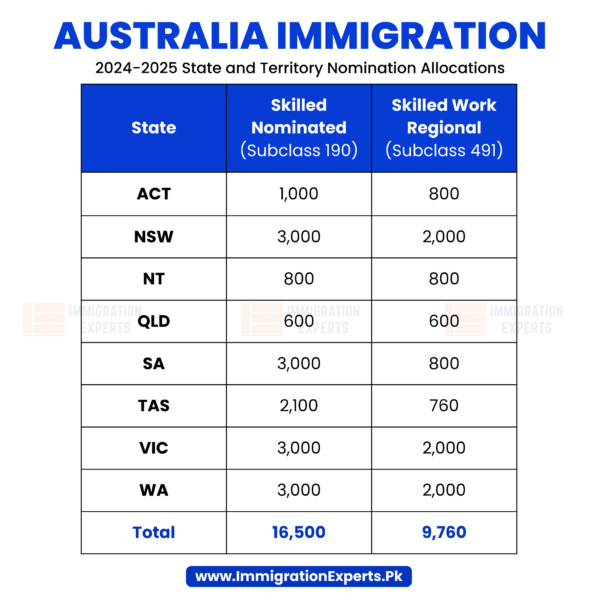051 8439995, 042 35911332

The Australian government has announced the Federal Budget for 2024/2025, outlining its plans for money coming in and going out for the year.
This budget has plans to change how immigration works in Australia. Here’s a summary:
Things You Will Find In This Page
Changes to Migration System and Funding for Department of Home Affairs
Over the next four years, the government will spend $18.3 million to improve Australia’s migration system. The goal is to help the economy grow and make the system more trustworthy. This money will be used for:
- $15.0 million over three years to educate migrant workers. They will get better information about their rights, how to stay safe at work, and following migration rules.
- $1.9 million in 2024–25 for a test program. This program will share information between the Department of Home Affairs and the Australian Taxation Office. They will look at people’s income and jobs to stop migrant workers from being treated badly and make sure everyone follows the rules.
Boosting Staffing and Resources
The budget also includes money to hire more people. This will help improve how services are given and make sure things run smoothly. It’s part of fixing previous problems and ensuring visa applications are processed faster.
Moreover, the Government has assigned $100 million to the Department of Home Affairs. This money is meant to strengthen the department’s crucial tasks, including operations by the Australian Border Force, ensuring immigration rules are followed, and maintaining important systems that support these operations and services.
Permanent Australian Immigration Program
The Government has set aside 185,000 spots for permanent migration in the 2024–25 period. Out of these, 132,200 spots, roughly 70%, are for skilled workers. Starting from the 2025–26 period, the Government plans to plan the permanent Australian Immigration Program for four years instead of just one. This is part of the ongoing efforts to improve how Australia’s migration system is managed and run.
It’s estimated that these measures will reduce net overseas migration by 110,000 people over the next few years, starting from July 1, 2024. The number of people moving to Australia from overseas is expected to drop significantly, from 528,000 in 2022–23 to about 260,000 by 2024–25. Here’s the breakdown of the permanent visa allocations for 2024-2025:

Please note that the allocation for Partner and Child visa categories depends on demand and is only provided as indicative planning levels.
Australia Announced Nomination Allocations for All States and Territories 2024-25
The Australian Government has published the state nomination allocations for the 2024-25 program year. These allocations are assigned to each state and territory for the Skilled Nominated visa (subclass 190) and the Skilled Work Regional (Provisional) visa (subclass 491).
Here is a detailed allocation breakdown for each state and territory in Australia:

Reduced Work Experience Requirement for Temporary Skill Shortage Visa (subclass 482)
Starting from November 23, 2024, the Government will decrease the work experience needed for the Temporary Skill Shortage (subclass 482) visa from two years to just one year for all applicants.
National Innovation Visa and Changes to Business Innovation and Investment Program
The Government is preparing to unveil a new visa initiative, the National Innovation Visa (NIV), by the conclusion of 2024. This visa will supersede the existing Global Talent visa (subclass 858), aiming to allure highly skilled migrants capable of enriching pivotal sectors’ advancement.
Simultaneously, the Business Innovation and Investment Visa Program (BIIP) will undergo cessation. Commencing September 2024, individuals opting to retract their BIIP applications will qualify for a reimbursement of their visa application fees.
While the discontinuation of the Business Innovation and Investment Visa Program (BIIP) is imminent, it’s noteworthy that the government is strategizing a program overhaul. The revamped program will be tailored towards candidates who possess the potential to make tailored and substantial contributions to Australia’s progress.
Pre-Application System for Work and Holiday Visa – Nationals of China, Vietnam, and India
Commencing in the 2024–25 period, the Government is set to introduce a pre-application (ballot) system for the Work and Holiday (subclass 462) visa program, targeting applicants from China, Vietnam, and India. This ballot mechanism aims to manage the program’s demand effectively and expedite the processing time for applications originating from these countries. A fee of $25 will be levied for participating in the ballot, subject to adjustments based on the Consumer Price Index (CPI) in subsequent years.
Boosting Southeast Asia Engagement with Additional Funding
The Government has allocated an extra $505.9 million to be distributed over five years, starting from 2023–24. Following this initial period, there will be a yearly contribution of $118.3 million. This funding is aimed at strengthening Australia’s connections with Southeast Asia and includes initiatives to advance the next phase of the Government’s plan as outlined in ‘Invested: Australia’s Southeast Asia Economic Strategy to 2040’.
Part of this funding, totaling $1.1 million spread over two years from 2023–24, will be used to enhance visa services. This includes providing long-term business visas and facilitating visas for frequent travelers from ASEAN nations and Timor-Leste.
Extending Business Visitor Visas for Citizens of India

The Visitor visa (subclass 600) in the Business Visitor stream for Indian nationals will see an extension of the visa stay period from up to three years to up to five years. The implementation date for this change has not yet been announced.
Introducing the Talented Early-Professionals Scheme (MATES)
Commencing on November 1, 2024, the Australian Government is launching the Mobility Arrangement for Talented Early-professionals Scheme (MATES). This innovative initiative aims to provide a fresh avenue for mobility for up to 3,000 Indian graduates and early-career professionals aged between 18 and 30. Individuals possessing expertise in specific fields of study will be allowed to reside and work in Australia for a period of up to two years.
Applicants will be required to pay a pre-application fee of $25, along with a visa application charge of $365. Both fees are scheduled to be adjusted annually to align with the Consumer Price Index (CPI).
Administrative Review Tribunal (ART) to Replace the Administrative Appeals Tribunal (AAT)
The Australian Government has committed $1.0 billion over the next five years to fund various initiatives. This includes an annual allocation of $210.8 million starting from 2028–29 and an additional $194.2 million distributed between 2028–29 and 2035–36. This significant investment aims to support key programs and projects across different sectors. This funding is dedicated to establishing and maintaining the new Administrative Review Tribunal (ART), which is set to replace the existing Administrative Appeals Tribunal (AAT). The introduction of ART aims to address the backlog in courts resulting from a substantial influx of migration judicial review applications.
Here’s a breakdown of the funding for ART’s establishment:
- An allocation of $854.3 million over the next four years, with an annual budget of $208.8 million thereafter, has been designated. This funding will facilitate a capped and flexible funding model based on demand, enabling ART to resolve all case submissions annually. It also includes improvements in regional accessibility and the trial of initiatives like the First Nations Liaison Officer and programs focused on enhancing user experience and accessibility.
- Additionally, $75.1 million is allocated over five years starting from 2023–24, with $2.0 million annually thereafter, to aid agencies in transitioning from AAT to ART.
- Furthermore, $2.4 million is allocated in 2024–25 to AAT for the Immigration Assessment Authority (IAA) to continue the merits review of protection visa applications eligible for expedited review under the Migration Act 1958 until ART becomes operational.
- Moreover, the Government will contribute $115.6 million over the next four years, with an additional $194.2 million from 2028–29 to 2035–36, to address significant migration case backlogs in federal courts. This includes establishing two migration hubs specifically for migration and protection visa cases.
Enhancing Migrant and Refugee Settlement Services
The Australian Government has committed to investing $120.9 million over the next five years to strengthen settlement services and promote better economic and social integration for refugees and migrants.
Here’s how the funds will be allocated:
- Humanitarian Settlement Program: $86.6 million over five years, starting from 2023–24, to support settlement services for refugees and migrants.
- Enhanced Support Services: $27.0 million over three years, beginning in 2024–25, to improve specific support services. This includes:
- Youth Transition Support services to assist refugee and migrant youth in engaging with education, employment, and government services.
- Specialized assistance for refugee and migrant women who are victims of domestic and family violence within the Settlement Engagement and Transition Support (SETS) Program.
- Additional settlement aid for Afghan humanitarian entrants.
- Conversational English Classes: $3.8 million over four years, starting from 2024–25, to sustain conversational English classes in Community Hubs.
- Extended Medicare Access: $1.9 million over five years, beginning in 2023–24, to extend Medicare access for Ukrainian individuals and their immediate family members holding a Bridging visa E until June 30, 2027.
- Community Refugee Integration and Settlement Pilot: $1.0 million for the fiscal year 2025–26 to continue the Community Refugee Integration and Settlement Pilot until June 30, 2026. This program facilitates settlement services through community volunteers.
- Administration Improvement: $0.6 million over four years, starting from 2024–25, to the Department of Home Affairs to enhance the administration of humanitarian settlement programs.
Additionally, this funding initiative plays a vital role in supporting the implementation of the National Plan to End Violence Against Women and Children, spanning from 2022 to 2032.
Introduction of the Leaving Violence Program (LVP)
The trial period for the Escaping Violence Payment and the Temporary Visa Holders Experiencing Violence Pilot is slated to continue until June 30, 2025. Building upon the positive outcomes and insights gained from these initiatives, the Leaving Violence Program is scheduled to commence in mid-2025, contingent upon securing a suitable service provider. Over the course of the next five years, the Government has pledged $925.2 million in funding, with an annual contribution of $263.3 million set to continue thereafter. This funding will facilitate the permanent establishment of the Leaving Violence Program, which offers financial assistance, safety assessments, and referrals to support services for individuals escaping violent relationships with intimate partners.
Here’s the breakdown of the funding:
- A total of $152.3 million has been designated for the expansion and prolongation of the Escaping Violence Payment and the Temporary Visa Holders Experiencing Violence Pilot trials for three years starting from 2023–24. This extension will continue until June 30, 2025. Moreover, it encompasses an additional provision of 12 weeks of support services for ongoing cases post the completion of the pilot programs. Subsequently, the Leaving Violence Program (LVP) will take over from these trials.
- $16.5 million disbursed over five years from 2023–24, with an additional $5.1 million in 2028–29, to sustain legal support for temporary visa holders seeking to extricate themselves from violent relationships.
Additionally:
- A total of $6.1 million will be allocated over the course of four years, starting from 2024–25, along with an annual ongoing contribution of $1.6 million. This funding is designated to provide specialized support for visa holders impacted by domestic and family violence, delivered through the Domestic and Family Violence visa support service.
